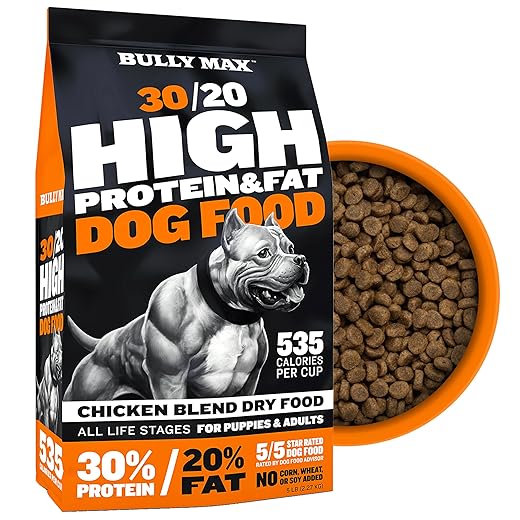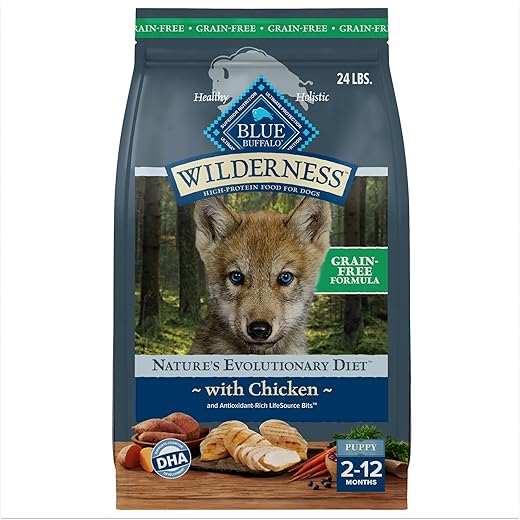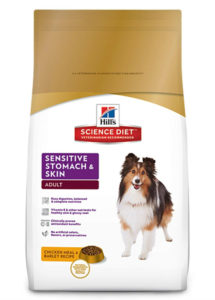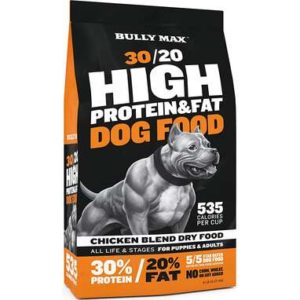When it comes to feeding Pitbull puppies, providing them with a high-quality and balanced diet is crucial for their growth and development. Pitbull puppies have specific nutritional needs that should be met to support their overall health and ensure proper bone and muscle development.
A well-formulated commercial puppy food designed for medium to large breeds is typically recommended for Pitbull puppies. These puppy foods are specifically formulated to provide the right balance of essential nutrients, vitamins, and minerals required for healthy growth.
Here are some key factors to consider when choosing dog food for Pitbull puppies:
- High-Quality Protein: Pitbull puppies require a diet rich in high-quality protein for proper muscle development. Look for puppy foods that list a named meat source, such as chicken, beef, or fish, as the primary ingredient.
- Balanced Nutritional Profile: A puppy food should provide a balanced ratio of proteins, fats, and carbohydrates to meet the energy needs of growing Pitbull puppies. Ensure the food contains adequate levels of essential fatty acids, vitamins, and minerals.
- Age-Appropriate Formulation: Select a puppy food specifically formulated for medium to large breed puppies, as they have unique growth requirements. These formulas typically have controlled calcium and phosphorus levels to support healthy bone development.
- Avoid Fillers and By-Products: Choose puppy foods that do not contain excessive fillers, artificial additives, or by-products. Look for natural, whole food ingredients that provide nutritional value without unnecessary additives.
- Consult with a Veterinarian: Your veterinarian can provide personalized recommendations based on your Pitbull puppy’s specific needs, including any dietary restrictions or sensitivities they may have.
Remember to follow the feeding guidelines provided by the dog food manufacturer and adjust the portion sizes as your puppy grows. It’s important to monitor their weight and body condition to ensure they are growing at a healthy rate.
Additionally, provide your Pitbull puppy with access to fresh water at all times, and consider incorporating some wet food or adding water to their kibble to ensure proper hydration.
By choosing a high-quality puppy food and providing proper nutrition, you can give your Pitbull puppy the best start in life and help set them up for a healthy and active adulthood.
Do Pitbull puppies need special food?
Pitbull puppies have specific nutritional needs during their growth and development stage, so it’s recommended to provide them with a high-quality, balanced puppy food that is specially formulated for their breed and age. Here are a few reasons why Pitbull puppies may benefit from special puppy food:
- Adequate nutrition: Pitbull puppies require a well-balanced diet that provides them with the right balance of proteins, fats, carbohydrates, vitamins, and minerals. Puppy food is formulated to meet their specific nutritional needs and support their growth and development.
- Controlled growth: Pitbull puppies are prone to rapid growth, which can put stress on their developing bones and joints. Specialized puppy food is formulated to promote healthy growth and ensure a balanced rate of development, reducing the risk of skeletal issues.
- DHA for brain development: Puppy food often contains DHA (docosahexaenoic acid), an omega-3 fatty acid that supports brain development and cognitive function. This nutrient is crucial for Pitbull puppies as they learn and develop during their early stages.
- Immune system support: Puppy food is designed to support a strong immune system, which is essential for Pitbull puppies as they are more susceptible to infections and diseases during their early months. It typically includes antioxidants and other immune-boosting ingredients.
While it’s important to feed Pitbull puppies a high-quality puppy food, it’s also crucial to consult with your veterinarian for personalized recommendations. They can assess your puppy’s specific needs, consider any existing health conditions, and provide guidance on the appropriate feeding schedule and portion sizes to ensure optimal growth and overall health.
What is the best food to feed a pitbull puppy?
When it comes to choosing the best food for a Pitbull puppy, it’s important to select a high-quality puppy food that meets their specific nutritional needs. Here are some factors to consider when choosing the best food for your Pitbull puppy:
- Protein Content: Pitbull puppies are active and energetic, so they require a diet rich in high-quality protein for proper muscle development. Look for puppy foods that have a high protein content, with a named meat source like chicken, beef, or fish listed as the first ingredient.
- Balanced Nutrition: A good puppy food should provide a balanced nutritional profile that includes the right balance of proteins, fats, and carbohydrates. It should also contain essential vitamins, minerals, and fatty acids to support overall growth and development.
- Age-Appropriate Formulation: Choose a puppy food specifically formulated for medium to large breed puppies. These formulas typically have controlled levels of calcium and phosphorus to support healthy bone growth and development.
- Natural and Whole Ingredients: Look for puppy foods that contain natural, whole food ingredients and avoid those with excessive fillers, artificial preservatives, or by-products. High-quality ingredients help ensure optimal digestion and nutrient absorption.
- Grain-Free or Limited Ingredient Options: Some Pitbull puppies may have sensitivities or allergies to certain grains or ingredients. Consider grain-free or limited ingredient options if your puppy shows signs of food sensitivities or if recommended by your veterinarian.
- Consult with a Veterinarian: Your veterinarian can provide personalized recommendations based on your Pitbull puppy’s specific needs, including any dietary restrictions or health concerns.
It’s important to follow the feeding guidelines provided by the dog food manufacturer and adjust the portion sizes as your puppy grows. Monitor your puppy’s weight and body condition to ensure they are growing at a healthy rate.
Remember to transition to new food gradually by mixing it with the previous food over a period of 7-10 days to prevent any digestive upset.
Regular veterinary check-ups can help monitor your Pitbull puppy’s growth and ensure they are on the right track with their nutrition.
Is Royal Canin a good dog food for pitbull puppy?
Royal Canin is a well-known and reputable brand that offers a range of dog food options, including formulas specifically designed for puppies. They have specific formulas tailored to different breeds and sizes, which can be beneficial for Pitbull puppies.
Royal Canin provides breed-specific nutrition that takes into account the unique needs and characteristics of Pitbulls. Their formulas often contain ingredients that support muscle development, joint health, and a healthy immune system, which are important for growing puppies.
However, it’s important to note that individual dogs may have different dietary needs and sensitivities, so what works well for one puppy may not work for another. It’s always a good idea to consult with your veterinarian before selecting a specific brand or formula for your Pitbull puppy. They can assess your puppy’s specific needs and make appropriate recommendations.
When choosing any dog food, including Royal Canin, it’s essential to read the ingredients list and ensure that it meets the nutritional requirements for puppies. Look for high-quality protein sources as the main ingredients and avoid foods that contain excessive fillers, artificial additives, or by-products.
Remember, a balanced diet, appropriate portion sizes, and regular veterinary care are key to ensuring the health and well-being of your Pitbull puppy.
What food is safe for Pitbull puppy?
There are several safe and nutritious food options for Pitbull puppies. Here are some guidelines for choosing safe and healthy food for your Pitbull puppy:
- High-quality puppy food: Look for commercial puppy food that is specifically formulated for large or medium-sized breeds. These formulas typically have the right balance of nutrients to support the healthy growth and development of your Pitbull puppy.
- Animal protein: Choose a puppy food that has a high-quality source of animal protein as the main ingredient. This can include chicken, turkey, beef, or fish. Animal protein is important for muscle development and overall growth.
- Balanced nutrition: Ensure that the puppy food provides a balanced combination of protein, fats, carbohydrates, vitamins, and minerals. Check the product’s label for a nutritional adequacy statement from the Association of American Feed Control Officials (AAFCO) to ensure it meets the required standards.
- Avoid artificial additives: Avoid puppy foods that contain artificial preservatives, colors, and flavors. Look for natural and wholesome ingredients instead.
- Digestible carbohydrates: Carbohydrates like whole grains (such as brown rice or oats) and vegetables provide energy and fiber. Avoid foods with excessive amounts of fillers or low-quality grains.
- DHA and Omega-3 fatty acids: These nutrients are beneficial for brain development and healthy skin and coat. Look for puppy foods that contain DHA and Omega-3 fatty acids from sources like fish oil.
- Avoid potential allergens: Some puppies may have food sensitivities or allergies. If you notice any signs of allergies (such as itching, digestive issues, or skin problems), consult your veterinarian for guidance on selecting a hypoallergenic or limited ingredient diet.
Always consult with your veterinarian for specific recommendations tailored to your Pitbull puppy’s individual needs. They can provide guidance on the appropriate portion sizes, feeding schedule, and any specific dietary considerations based on your puppy’s health and development.
What foods pitbull puppies Cannot eat?
While Pitbull puppies have specific dietary needs, there are certain foods that should be avoided as they can be harmful or toxic to dogs. Here are some foods that Pitbull puppies should not eat:
- Chocolate: Chocolate contains theobromine, which can be toxic to dogs. It can cause symptoms like increased heart rate, vomiting, diarrhea, and in severe cases, seizures or even death.
- Grapes and raisins: Grapes and raisins can cause kidney failure in dogs. Even small amounts can be toxic and lead to symptoms like vomiting, diarrhea, lethargy, and decreased appetite.
- Onions and garlic: These foods, in any form (raw, cooked, or powdered), contain compounds that can damage a dog’s red blood cells, leading to anemia. Symptoms may include weakness, vomiting, and pale gums.
- Avocado: Avocados contain a substance called persin, which can be toxic to dogs. It can cause vomiting, diarrhea, and in some cases, pancreatitis.
- Alcohol: Alcohol is highly toxic to dogs and can lead to alcohol poisoning. It can cause symptoms like disorientation, vomiting, difficulty breathing, and even coma or death.
- Xylitol: Xylitol is a sugar substitute found in many products like chewing gum, candy, and baked goods. It is highly toxic to dogs and can cause a sudden release of insulin, leading to low blood sugar levels. Symptoms include weakness, vomiting, seizures, and liver failure.
- Caffeine: Caffeine can be found in coffee, tea, energy drinks, and some sodas. It is toxic to dogs and can cause symptoms like restlessness, increased heart rate, tremors, and in severe cases, seizures.
It’s important to note that this is not an exhaustive list, and there may be other foods that can be harmful to Pitbull puppies. It’s always best to consult with your veterinarian to get a comprehensive list of foods to avoid and to ensure your puppy’s diet is safe and healthy.
What dog food are Pitbull puppies allergic to?
Pitbull puppies, like any other dogs, can develop allergies to certain ingredients in their food. The specific ingredients that may trigger allergies can vary from dog to dog, as each individual may have different sensitivities. However, some common allergens in dog food that Pitbull puppies may be allergic to include:
- Grains: Wheat, corn, and soy are common allergenic grains that can cause allergic reactions in some puppies.
- Protein sources: Beef, chicken, dairy products, and eggs are potential allergenic protein sources for dogs. While these proteins are not inherently harmful, some puppies may develop allergies or sensitivities to them.
- Artificial additives: Artificial preservatives, colors, and flavors found in some dog foods can also be potential allergens.
If you suspect that your Pitbull puppy has food allergies, it’s best to consult with a veterinarian. They can help determine the specific allergens through diagnostic testing, such as elimination diets or allergy tests, and guide you in selecting an appropriate hypoallergenic diet or alternative ingredients that your puppy can tolerate. Remember, it’s important to address food allergies to ensure your puppy’s health, comfort, and overall well-being.
What is pros and cons of using dog food for pitbull puppies?
Using specialized dog food formulated for Pitbull puppies can have several pros and cons. Here are some considerations:
Pros:
- Balanced nutrition: Good-quality dog food designed for Pitbull puppies typically provides balanced and complete nutrition, including the essential nutrients, vitamins, and minerals that puppies need for their growth and development.
- Age-appropriate formulas: Puppy-specific dog food takes into account the specific nutritional needs of growing puppies, including higher levels of protein and calories to support their energy requirements.
- Targeted ingredients: Many Pitbull puppy food options are formulated with ingredients that support joint health, muscle development, and a healthy immune system, which can be beneficial for this active and muscular breed.
- Convenience: Using commercial dog food eliminates the need to prepare homemade meals, ensuring that your puppy gets a consistent and convenient source of nutrition.
Cons:
- Cost: Specialized dog food for Pitbull puppies can be more expensive compared to generic or adult dog food options. However, investing in high-quality puppy food can help prevent health issues in the long run.
- Ingredient quality: Not all dog food brands or formulas are created equal. Some may contain lower-quality ingredients, fillers, or artificial additives. It’s important to carefully read and understand the ingredient list and choose a reputable brand that prioritizes quality ingredients.
- Individual sensitivities: Every puppy is unique, and some Pitbull puppies may have specific dietary sensitivities or allergies to certain ingredients. It may require some trial and error to find the right food that suits your puppy’s individual needs.
- Transitioning challenges: Switching from one brand or type of dog food to another can sometimes cause digestive upset or reluctance to eat. Gradual transitions and monitoring your puppy’s response can help mitigate any potential issues.
Ultimately, the decision to use specialized dog food for your Pitbull puppy should be based on your puppy’s specific needs, preferences, and any guidance from your veterinarian. It’s important to prioritize a well-balanced diet that supports your puppy’s growth, health, and overall well-being.
How often should I change dog food for pitbull puppies?
The frequency of changing dog food for Pitbull puppies can vary depending on several factors, including the specific needs of your puppy and any guidance from your veterinarian. Here are some general guidelines to consider:
- Puppy Stage: Pitbull puppies typically require a specialized puppy formula designed to support their growth and development. It’s recommended to feed them a high-quality puppy food for the first 12 to 18 months of their life.
- Gradual Transitions: When transitioning to a new brand or type of dog food, it’s important to do so gradually to allow your puppy’s digestive system to adjust. Start by mixing a small amount of the new food with the current food, gradually increasing the proportion of the new food over a period of 7 to 10 days.
- Sensitivities or Allergies: If your Pitbull puppy exhibits signs of food sensitivities or allergies, such as skin issues, gastrointestinal problems, or persistent discomfort, you may need to consider changing their food. In such cases, consult with your veterinarian to determine the appropriate dietary adjustments.
- Health and Development: As your Pitbull puppy grows and reaches different life stages, their nutritional needs may change. Regularly consult with your veterinarian to assess your puppy’s health and development and determine if any adjustments to their diet are necessary.
- Individual Considerations: Each puppy is unique, and there may be specific factors such as sensitivities, dietary preferences, or health conditions that warrant a change in dog food. Your veterinarian can provide personalized recommendations based on your puppy’s specific needs.
It’s important to note that abrupt changes in diet can disrupt your puppy’s digestion and lead to gastrointestinal upset. When considering a change in dog food, it’s best to consult with your veterinarian for guidance tailored to your Pitbull puppy’s individual needs.
Do you really need dog food for pitbull puppies?
Yes, it is generally recommended to provide specific dog food formulated for Pitbull puppies. Here are a few reasons why:
- Nutritional Needs: Pitbull puppies have specific nutritional requirements during their growth and development stage. They need a well-balanced diet that provides the right balance of protein, fat, carbohydrates, vitamins, and minerals to support their rapid growth, muscle development, and overall health. Dog food for puppies is specifically formulated to meet these needs.
- Controlled Nutrition: Commercial dog food for Pitbull puppies is carefully formulated to provide the optimal balance of nutrients and calories to support healthy growth and development. It ensures that your puppy receives all the essential nutrients in the right proportions, which can be challenging to achieve with homemade diets.
- Quality and Safety: Reputable dog food brands undergo rigorous testing and quality control measures to ensure the safety and nutritional quality of their products. They are formulated by veterinary nutritionists who understand the specific needs of growing puppies. Choosing a high-quality commercial dog food reduces the risk of nutritional deficiencies or imbalances that could impact your puppy’s health.
- Convenience and Consistency: Feeding your Pitbull puppy a commercial dog food eliminates the need to prepare homemade meals, which can be time-consuming and require careful attention to ensure proper nutrition. Commercial dog food provides a convenient and consistent option, allowing you to easily meet your puppy’s dietary needs.
While homemade diets can be an option for some pet owners, it requires careful planning and consultation with a veterinary nutritionist to ensure they meet all of the puppy’s nutritional requirements. If you choose to prepare homemade meals for your Pitbull puppy, it’s essential to work with a veterinarian or veterinary nutritionist to develop a balanced and appropriate diet.
Ultimately, the decision on whether to use commercial dog food or homemade diets for your Pitbull puppy is a personal one. However, it’s important to consider the nutritional needs of your puppy and consult with a veterinarian to make an informed decision that supports their health and well-being.
You May Also Like These Deals!
What food is best for pitbulls with skin allergies?
Pitbulls, like other breeds, can sometimes develop skin allergies that...
Read MoreWhat is the best food for a Pitbull?
Pitbulls, like all dogs, require a balanced and nutritious diet...
Read MoreWhat is the best dog food?
Dog food refers to the specially formulated food that is...
Read MoreProducts recommended in the post contain affiliate links. We may receive a commission when you buy something through our posts.
Why Trust Us
You will find what you are looking for at Black Friday Weeks. From classic to luxury brands, you'll find both. We will help you to select appliances that fit your needs, budget and lifestyle. Whether you want to stop by to learn more — or plan to make a major purchase — we’ll treat you like family and assist you every step of the way. Shop with us today to receive friendly and experienced help along the way.









